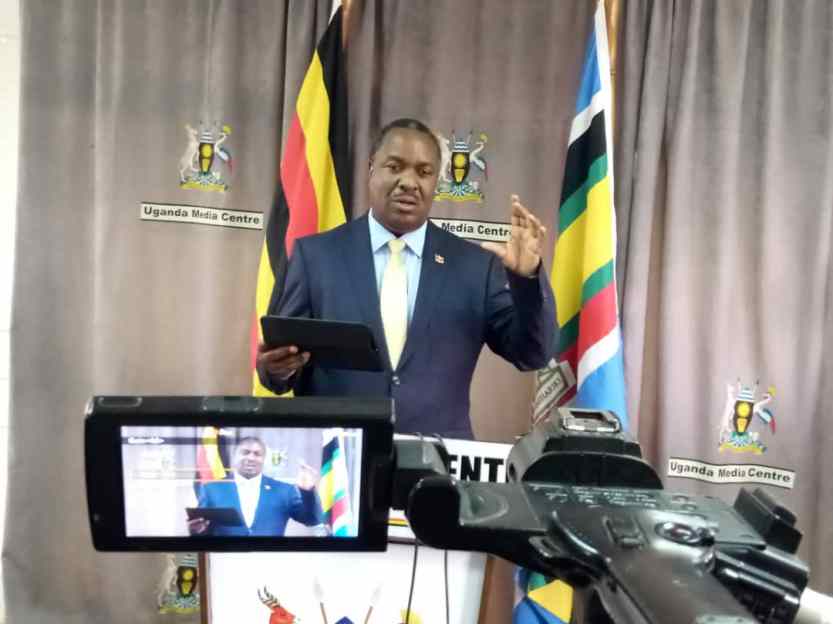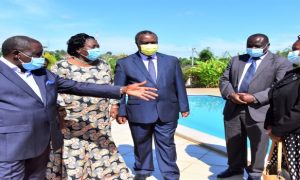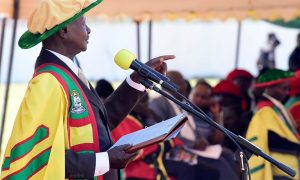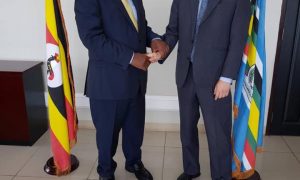
Only after three years since its establishment of the Ministry of Science Technology and Innovation, Uganda elected Chair of the AU Committee on Education, Science and Technology.
This implies Dr. Elioda Tumwesigye now chairs Ministers of Education, Science & Technology on the African Continent.
The Ugandan Ministry of Science, Technology and Innovation has been recognized by its peers by electing Uganda to chair the Specialized Technical Committee on Education, Science and Technology (STC-EST) of the African Union for the next two years.
This was at the 3rd Session of the STC-EST held at the AU Headquarters in Addis Ababa, Ethiopia last week at which Uganda’s Director Science, Technology, Innovation, Regulation and Biosafety Dr. James Kasigwa chaired the technical Experts Meeting and I chaired the Ministerial Meeting of the STC-EST.
The meeting was attended by African Union (AU) member states (represented by Ministers and Technical Experts in Education, Science and Technology), Development Partners, and Partner Institutions.
The Chairperson of the Specialized Technical Committee Meeting on Education,
Science and Technology (STC- EST) is elected by the 55 member countries form
the five regions (Northern Africa, Southern Africa, Eastern Africa, Western
Africa and Central Africa).
The 12 Countries in the East African region include Tanzania, Rwanda, Burundi, Somalia, Sudan, Ethiopia, Djibouti, Comoro, Madagascar, South Sudan, Somalia, and Uganda. Uganda will hold the Chair of the STC- EST till December 2021.
As the chair of the STC–EST, Uganda will among others be in charge of the
following:
i. Elaborate, adopt, and monitor the
implementation of the African Continental Strategy for Education, the
Continental Strategy for Technical and Vocational Education and Training, and
other African Union strategies and programmes and plans of action in education
and training;
ii. Ensure that Member States
provide education data to the African Union Education Observatory;
iii. Ensure that Member States provide Science, Technology and Innovation data to the African Observatory on Science, Technology and Innovation Indicators (AOSTI);
iv. Establish performance indicators and receive
reports on the performance of national, regional and continental agencies and
institutions in education, training, science, technology and innovation;
v. Review and endorse initiatives
and proposals to promote the co-ordination and the strengthening of education,
training, science, technology and innovation programmes and interventions in
the region;
vi. Monitor the implementation of
the Science, Technology and Innovation Strategy for Africa (STISA 2024) and
other African Union strategies, policy frameworks and plans of action in
science, technology and innovation at national, regional, and continental
levels;
vii. Facilitate policy dialogue at
the national, regional and continental levels between Member States and between
the African Union and Regional Economic Communities on matters of education,
training, science, technology and innovation;
viii. Engage with Member States to
mobilize resources to support the implementation of programmes and projects
endorsed by the STC on
Education, Science and Technology;
ix. Engage with international development
partners and the African Diaspora to mobilize resources to support capacity
building programmes for the implementation of identified projects, programmes
and priority actions;
x. Monitor, follow-up and evaluate
the implementation of decisions taken by the Policy Organs of the Union in the
areas of education, training, science, technology and innovation;
xi. Ensure the coordination and
harmonization of projects and programmes of the Union; xii. Oversee the
promotion, co-ordination and the strengthening of Education,Training, Science,
Technology and Innovation programmes for the accelerated socio-economic
sustainable growth of Africa and in response to the Sustainable Development
Goals;
xiii. Implement programmes and
projects in support of the Sustainable
Development Goals; xiv. Submit to the policy organs of the Union either on its
own initiative or at the request of the policy organs, reports and
recommendations on the implementation of the provisions of its portfolio;
xv. Oversee annual work plans of the
Commission on education, training, science, technology and innovation;
xvi. Carry out any other functions
assigned to it by the policy organs of the Union.
The AU Agenda 2063 recognizes Science, Technology and Innovation (STI) as
multi-functional tools and as enablers for achieving continental development
goals. The Agenda, further, emphasizes that Africa’s sustained growth,
competitiveness and economic transformation requires sustained investment in
new technologies and continuous innovation in areas such as agriculture, clean
energy, education and health.
Science Technology and Innovation in
Uganda
The Government of Uganda established
the Ministry of Science, Technology and Innovation (MOSTI) on recognizing
Science, Technology and Innovation (STI) as key drivers of socio-economic
growth and transformation the world over.
Science, Technology and Innovation development is an important determinant of progress and transition from pre-industrial to knowledge-based societies. Therefore, the extent to which a country harnesses STI has a direct bearing on its level of development.
Uganda is among the countries hampered with
development challenges due to among others the low levels of adaptation,
transfer and diffusion of Technology and Innovation. The Ministry of Science,
Technology is addressing the above challenge by:
i. Formulating Policies, Strategies, Plans and legal framework pertaining to Science,
Technology and Innovation in the country;
ii. Identifying and aligning National Science, Technology and Innovation
(ST&I) priorities with the broader National Development Goals. This is
achieved through the sector working group that includes other sectors,
Ministries, Development Partners, Non- Government Organizations, Small Medium Enterprises,
the Academia, Researchers, Manufacturers, Innovators, Scientists and the
Private Sector among others;
iii. Mobilizing resources necessary for effective management of ST&I
efforts in the country, their coordination and implementation, and monitoring
and evaluating of their outcome to foster development;
iv. Putting in place the necessary infrastructure for ST&I that meets
international standards including among others Science and Technology Parks,
Engineering and STI Skills Enhancement Centers as well as Technology and
Business Incubation Centers in accordance with the Uganda Vision 2040.
v. Promoting exploitation of patents and Intellectual Property Rights (IPR)
arising out of ST&I efforts for commercialization of products;
vi. Providing technical support for Uganda’s bilateral and multilateral science
and technology programs.
vii. Supporting public private partnerships in Science, Technology and
innovation. Government will target areas for innovation and link up with
private sector innovators, with a view of developing viable solutions for
commercialization; ix. Supporting research and development institutions The
Ministry of Science, Technology and Innovation is mandated to provide policy
guidance and coordination on matters of Scientific Research, Development and
the entire National Innovation System in Uganda.
Our vision is a “Scientifically Proficient and Technologically Advanced Innovative Society”. In order to realize this vision, as a sector, we are championing a number of programmes and projects that are aimed at not only promoting science but also improving the wellbeing of Ugandans through advancement of Science, Technology and Innovation and include the following:
i. Establishment of the National Research and Innovation Program (NRIP) aimed
at supporting our innovators and scientists translate ideas and research and
development outputs into commercialized outcomes (products, processes or
services). NRIP Framework was passed by Cabinet in March this year and I
recently appointed the NRIP Steering committee which will soon issue calls for
submission of applications for research and innovation funding.
ii. The Machining Manufacturing and Industrial Skills Training Centre Project
which was initiated by H.E President Yoweri Museveni and is being implemented
by my Ministry through Uganda Industrial Research Institute (UIRI). Under this
project construction and equipment of an ultra-modern machines producing
machine facility has been completed in Namanve and the facility will officially
be handed over this Friday 20th December. We want our youth and University
graduates and technicians to be able to be trained here and given skills to
produce most of the spare parts of most factory machines in Uganda instead of
importing them including automotive parts for Kiira Motors vehicles.
iii. We recently launched the Kayoola EV Bus assembled by Kiira Motors
Corporation, another Agency under my Ministry. We shall continue assembling a
few buses using the NEC facility in Nakasongora.
In addition construction of a Vehicle Assembly Plant by Kiira Motors in collaboration with NEC is in advanced stages in Jinja. When completed this facility will enable Uganda to manufacture vehicles here for the local, regional, African and Global market. We are also finalizing the Automotive Industry Policy.
iv. The National Science Technology and Engineering Skills Enhancement Project (NSTEI) implemented by the Uganda National Council for Science and Technology (which is one of the agencies under my Ministry), aimed at providing incubation facilities for our scientists as well as enhancing STEI skills of young technicians and engineers; retooling unemployed graduates and supporting them to establish Start-UP businesses to undertake infrastructural development of the country and local manufacturing of products for import-substitution and export diversification.
Under this project, a Pilot Technology and Business Incubation Centre (TIBIC) is being built in Namanve and the National Science, Technology, Engineering and Innovation (STEI) Centre is being established in Sanga.
v. Science and Technology Parks—My Ministry is working with Universities to
establish Regional Science and Technology Parks that will help translate
research and development outputs into commercialized outcomes such as products,
processes and services through high tech industries and state-of the– art
research and development centers.
vi. Technology and Business Incubation Centres (TIBIC) and Municipal Innovation
& Technology Hubs (MIT Hubs)- these will be established in a phased manner
in collaborative Districts and Municipalities in the country. These facilities
will provide workspaces, common user facilities and value addition equipment
that will enable start-up businesses created under the above-mentioned National
Science Technology and Engineering Skills Enhancement Project and elsewhere to be
nurtured into viable businesses for job creation and income generation.
vii. We are in the final stages of transforming PIBID into a legal entity
called Banana Industrial Research and Development Centre (BIRDC) to enable
legal trade in banana derived products. BIRDC will work with the private sector
to establish industries in the Industrial technology Park in Sanga Town
Council.
viii. National Space Science Programme, aimed
at launching Uganda into Space by 2022. The Space programme has very many
applications and will help the Country in a number of ways including remote
sensing & mapping our resource endowments such as minerals, water, etc;
improving agriculture, forestry, security, tourism, urban planning and weather
forecasting etc.
ix. Establishment of Material Science and Nanotechnology Centres that will
incorporate research in mineralogy and advanced materials.
x. Establishment of an Indigenous Knowledge Institute
xi. Establishment of Petro-chemical research facilities
xii. Establishment of Biosciences Technology Development Centres
Therefore, it is clear that the NRM Government led by H.E. President Yoweri
Kaguta Museveni has prioritized Science, Technology and Innovation to lead the
Government efforts to industrialize the Country. This is being achieved through
scaling-up commercialization of scientific innovations and technological
advancements which will in turn help create jobs and generate wealth through
production of new products for import substitution and export diversification.
This will create enormous opportunities for our creative and innovative young
people.
Finally, my Ministry commits itself to implementing the Uganda Vision 2040,
NDPIII, the NRM Manifesto by providing effective leadership, an enabling
environment for research, and scientific based development for
industrialization, competitiveness, employment creation leading to sustainable
economy. MoSTI will continue to work with other sectors to promote human
resource development, science, research and innovation as well as digital transformation
of Uganda to create “A scientifically proficient and technologically advanced
innovative society”
I wish you Merry Christmas as well as Good Health, Prosperity, Peace and
Happiness in the New Year 2020.




























